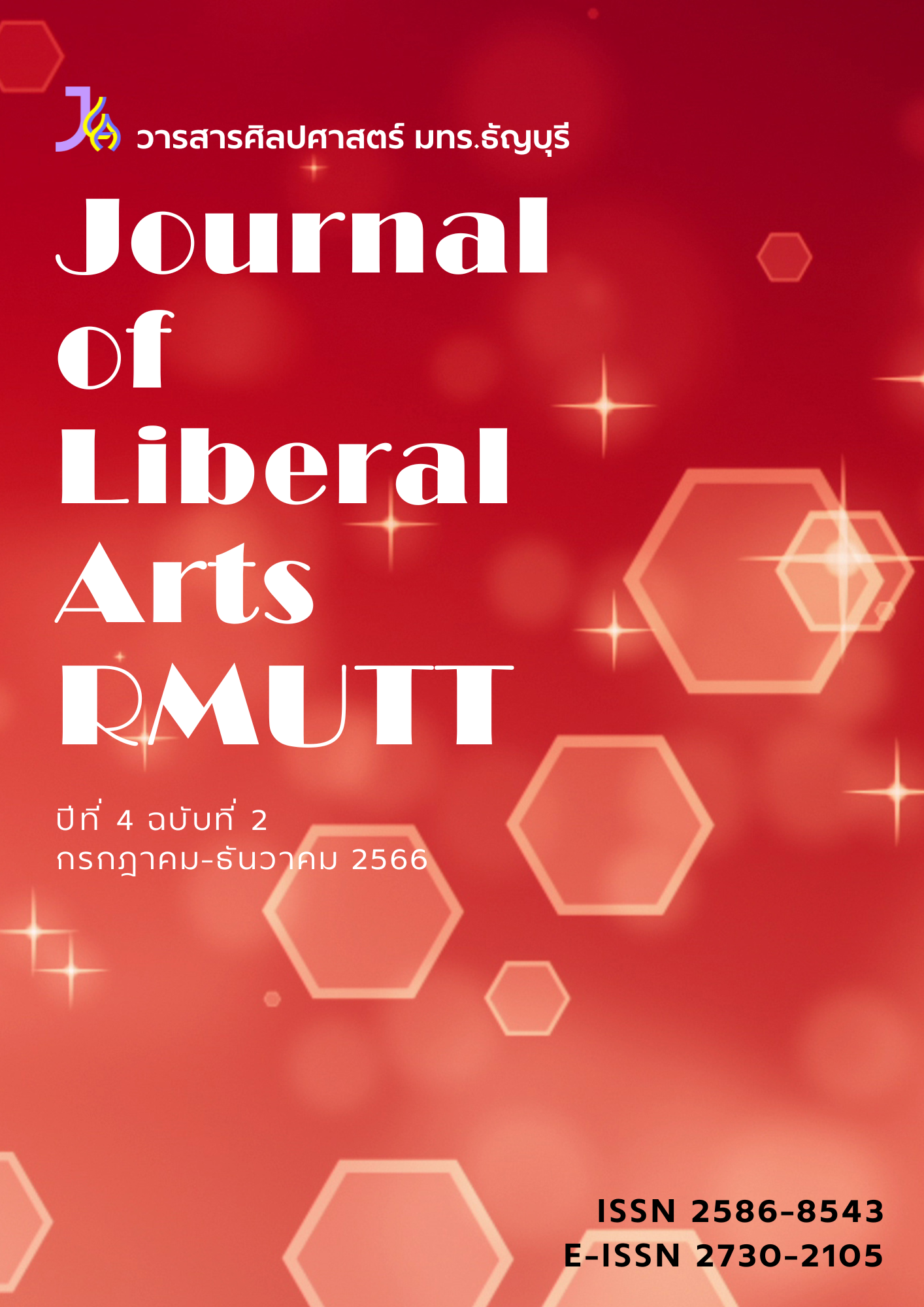Beliefs and Faith Encouraging Tourism in Phatthalung Province
DOI:
https://doi.org/10.60101/jla.2023.4.2.3287Keywords:
Tourism in Phatthalung Province, belief, faithAbstract
The objective of this research is to study and present the beliefs, attitudes, and travel behaviors in the area of Phatthalung Province. It aims to establish connections that can motivate and drive tourists to engage in travel activities. The research utilizes a qualitative research methodology through studying documents and conducting non-participatory observations, as well as analyzing data through content analysis.
The study found that beliefs and faith in the area of Phatthalung province can be divided into three categories: 1) Beliefs related to sacred objects, 2) Beliefs related to local teachers or important figures and 3) Beliefs associated with religious ideologies. These beliefs and faith, which stem from the origin of sacred rituals, have promoted the development of the belief-related tourism in the area. As a result, tourists have been increasingly visiting the region each year. The relevant organizations have been fostering the faith-based tourism, enhancing the physical development of the sacred sites, and improving access routes to tourist destinations. This faith-based tourism allows travelers to gain knowledge about the history of the place and the interconnected historical narratives. For instance, the connection between Wat Khao Om and the legendary Khun Phan heritage in the southern region serves as an external factor that captivates tourists who value history. In addition to the internal factors influenced by personal beliefs and faith, which impact thoughts and travel decisions, historical factors play a significant role in attracting tourists who prioritize historical significance. Thus, these factors collectively contribute to the motivation and decision-making process for tourists' travel and tourism experiences.
References
กลุ่มวิทยาลัยครูภาคใต้. (2526). ความเข้าใจเกี่ยวกับสังคม. กรุงเทพมหานคร: กรุงสยามการพิมพ์.
ชนัญ วงษ์วิภาค. (2552). เอกสารประกอบการสอนวิชาการจัดการท่องเที่ยวเชิงวัฒนธรรม. นครปฐม: คณะโบราณคดี มหาวิทยาลัยศิลปากร.
จำเป็น เรืองหิรัญ. (2564). ประเพณีแห่ผ้าขึ้นธาตุวัดพระบรมธาตุเจดีย์เขียนบางแก้ว. สืบค้นเมื่อ 10 เมษายน 2564, จาก
https://www2.m-culture.go.th/phatthalung/ewt_news.php?nid=3313&filename=index
นฤพนธ์ ด้วงวิเศษ. (2560). แนวคิดมานุษยวิทยากับการศึกษาความเชื่อ สิ่งศักดิ์สิทธิ์ในสังคมไทย. วารสารวิชาการมนุษยศาสตร์และสังคมศาสตร์, 25(47), 173-197.
นิมิตรชัย ชูปู, เก็ตถวา บุญปราการ และปัญญา เทพสิงห์. (2559). การประกอบสร้างพื้นที่ศักดิ์สิทธิ์และพิธีกรรมของวัดเขียนบางแก้ว อำเภอเขาชัยสน จังหวัดพัทลุง. ใน การประชุมหาดใหญ่วิชาการระดับชาติ และนานาชาติ ครั้งที่ 7, หน้า 69-89. สงขลา: มหาวิทยาลัยหาดใหญ่.
ประเมศฐ์ พิชญ์พันธ์เดชา. (2561). การจัดการการท่องเที่ยวเชิงศาสนาของเกาะฮ่องกง ที่มีอิทธิพลต่อนักท่องเที่ยวชาวไทย. (วิทยานิพนธ์ปริญญามหาบัณฑิต). มหาวิทยาลัยธรรมศาสตร์, ปทุมธานี.
ปิ่น บุตรี. (2557). โนราโรงครูวัดท่าแค” พัทลุง...สุดยอดงานโนรา ทรงคุณค่าคู่แดนใต้. สืบค้นเมื่อ 28 เมษายน 2566, จาก https://amp.mgronline.com/Travel/9590000052662.html
พงศ์อินทร์ นันทวงศ์, เรณู เหมือนจันทร์เชย และขนบพร วงศ์กาฬสินธุ์. (2562). การจัดการมรดกทางวัฒนธรรม : กรณีศึกษา ศาลเจ้าพ่อขุนศรัทธาบ้านท่าแค ตำบลท่าแค อำเภอเมือง จังหวัดพัทลุง. อินทนิลทักษิณสาร, 14(1), 43-63.
พรรณ์ธิดา เหล่าพวงศักดิ์. (2559). แนวทางการพัฒนาการท่องเที่ยวเชิงศาสนาเพื่อรองรับนักท่องเที่ยวกลุ่มประชาคมเกษียณ จังหวัดกาญจนบุรี. วารสารวิชาการมหาวิทยาลัยธนบุรี, 10(21), 35-43.
พระมหามนัสวี ฐิตธมฺโม (อารยะนรากูล). (2564). การจัดการความเชื่อที่มีผลต่อจิตใจเชิงพุทธ: กรณีศึกษาวัดเจดีย์ (ไอ้ไข่). วารสารมหาจุฬานาครทรรศน์, 8(6), 61-76.
พิชคุณ อรรถเวชาสกุล และมนตรี วิวาห์สุข. (2566). พุทธ พราหมณ์ ผี : ความเชื่อและการท่องเที่ยวเชิงวัฒนธรรมณ เขาคิชฌกูฏ จังหวัดจันทบุรี. วารสารศิลปศาสตร์(วังนางเลิ้ง) มหาวิทยาลัยเทคโนโลยีราชมงคลพระนคร, 3(1), 12-33.
ภริมา วินิธาสถิตย์กุล และพระมหาจิรฉันท์ จิรเมธี (โลวะลุน). (2558). คติชนวิทยา: ความเชื่อกับสังคมไทย. วารสาร มจร มนุษยศาสตร์ปริทรรศน์, 1(1), 31-43.
เสฐียร พันธรังษี. (2524). ศาสนาเปรียบเทียบ. กรุงเทพฯ: แพร่พิยา.
สำนักงานวัฒนธรรมจังหวัดพัทลุง. (2563). พิธีกรรมสำนักเข้าอ้อ พิธีกรรมแช่ว่านยา สํานักวัดเขาอ้อ จังหวัดพัทลุง. สืบค้นเมื่อ 28 เมษายน 2566, จาก https://www2.m-culture.go.th/phatthalung/ewt_news.php?nid=2260&filename=King
อธิป จันทร์สุริย์, สุดสันต์ สุทธิพิศาล และขวัญณภัทร ขนอนคราม. (2563). แนวทางการพัฒนาการท่องเที่ยวเชิงสร้างสรรค์บนฐานอัตลักษณ์ ความเป็นไทยตลาดไทยย้อนยุคบ้านระจัน จังหวัดสิงห์บุรี. ทีทัศน์วัฒนธรรม, 19(2), 140-161.
อธิป จันทร์สุริย์. (2564). มูเตลู: ความเชื่อกับการท่องเที่ยว. ทีทัศน์วัฒนธรรม, 20(1), 220-240.
Art of Traveler. (2559). โนราโรงครูท่าแค ชีวิตที่ถูกกำหนดของเกรียงเดช ขำณรงค์. สืบค้นเมื่อ 28 เมษายน 2566, จาก
Crompton, J. (1979). Motivations of pleasure vacations. Annals of Tourism Research, 6(4), 408-424.
Dann, G. (1977). Anomie, Ego-enhancement and Tourism. Annals of Tourism Research, 4(4), 184-194.
MCOT DIGITAL. (2566). รู้จักขุนพันธ์ ที่เป็นมากกว่า มือปราบ จอมขมังเวทย์. สืบค้นเมื่อ 8 พฤษภาคม 2566, จาก
https://www.mcot.net/view/Kf18UoyT
Nye, Joseph S., Jr. (2004). Soft Power: The Means to Success in World Politics. New York: Public Affairs.
Travel 360 travel around the direction. (2566). สืบสานศิลป์ถิ่นโนรา โนราโรงครูวัดท่าแค 2566. สืบค้นเมื่อ 8 พฤษภาคม
Downloads
Published
How to Cite
Issue
Section
License
Copyright (c) 2023 Journal of Liberal Arts RMUTT

This work is licensed under a Creative Commons Attribution-NonCommercial-NoDerivatives 4.0 International License.













